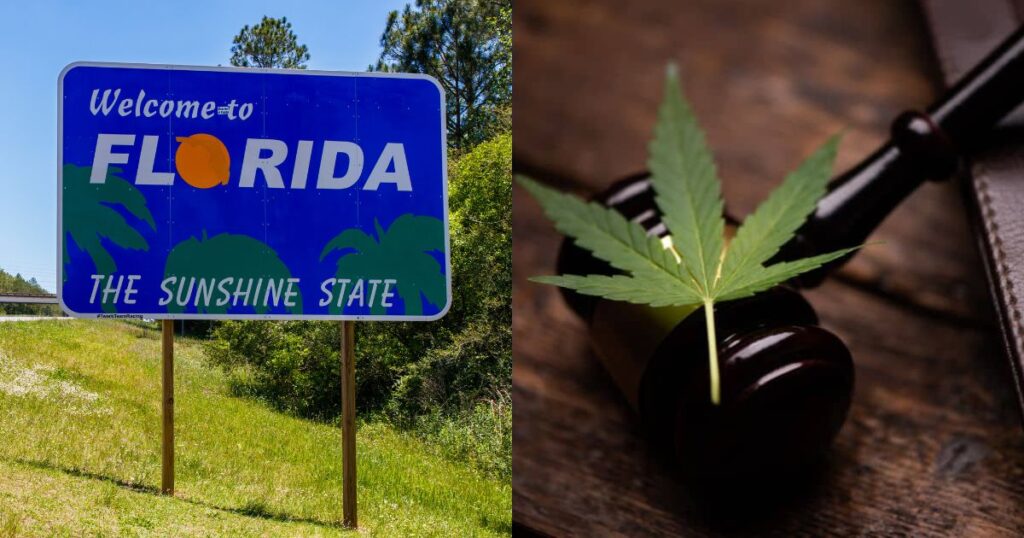Efforts to legalize recreational cannabis in Florida are once again taking center stage as the political committee, Smart & Safe Florida, reaches a its next milestone in order to get on the 2026 ballot. After the narrow failure of an amendment in 2024, this new initiative is designed to not only refine its approach but address past criticisms in hopes of gaining the 60% voter approval required for constitutional amendments.
With a legal review by the Florida Supreme Court now underway, the path is set, but hurdles remain. Let’s take a look at the differences in the new initiative, the challenges faced by Smart & Safe Florida, and the significant role that Trulieve, the state’s largest medical marijuana operator, is playing once again.
The 2024 Effort and Lessons Learned?
Back in 2024, a proposed amendment led by Smart & Safe Florida earned 56% approval among voters, falling just short of the 60% needed. Despite its popularity, especially in urban areas, it faced significant opposition from state leaders including Governor Ron DeSantis. Opponents highlighted concerns ranging from public smoking to industry regulation, effectively swaying undecided voters.
Fast forward to 2026, and the group has introduced a more fine-tuned version of their proposal. Here’s how it differs from the first attempt:
- Clearer Restrictions on Public Use: The new version explicitly prohibits smoking marijuana in public spaces, addressing the crazy claims by DeSantis that the earlier version would have created a public nuisance, and that every city would smell like marijuana.
- Prohibition of Marketing to Children: Ensuring that the initiative explicitly bans advertising targeting minors to assuage concerns about the industry’s influence on young Floridians.
- Vertical Integration Reforms: Unlike the previous amendment, the new proposal states that licensed marijuana companies won’t be required to handle the growing, processing, and selling of their products. This change could lead to a more open and competitive industry structure.
These modifications aim to clarify the legislation and respond to opponents’ main criticisms.
Trulieve’s Major Investment in Florida’s Recreational Cannabis Legalization
Leading the financial charge for this initiative is Trulieve Cannabis Corp., Florida’s largest medical marijuana operator. Trulieve has invested nearly $20 million into this 2026 campaign, on top of roughly $150 million spent on the 2024 effort, which made it the largest cannabis legalization initiative in history.
With over 150 retail locations in Florida alone, Trulieve stands to gain enormously from a legalized recreational market. Despite the company’s extensive contributions, skeptics have accused it of prioritizing corporate profits.
However, Smart & Safe Florida has emphasized that this campaign is about bringing Florida into alignment with the growing number of states that allow recreational marijuana use.
Overcoming New Legislative Hurdles
Smart & Safe Florida not only faces opposition from voters but also significant challenges due to a new state law signed by Governor DeSantis in 2025. This law has made it far more difficult for citizen-led amendments to make it onto the ballot.
One major change is the introduction of stricter petition rules. Petition circulators must now submit completed signatures within 10 days, a dramatic reduction from the previous 30-day timeframe.
Additionally, the new rule allows only Florida residents to circulate petitions, greatly limiting the pool of available volunteers. To make the process even more challenging, the rules restrict each volunteer to collecting no more than 25 petitions.
These new regulations have added considerable barriers to the already challenging process of citizen-led initiatives.
These measures have already slowed the group’s momentum, nearly cutting their weekly signature collection rate by 75% (from 78,000 to 12,000-15,000), according to the Florida Phoenix. Smart & Safe Florida is currently challenging these restrictions in federal court, arguing that they violate First Amendment protections.
What’s Next?
The Florida Supreme Court is set to review whether the amendment adheres to the single-subject rule and if its ballot summary is clear. The campaign’s progress depends on several key factors.
First, the court must approve the ballot language, ensuring it is both clear and lawful. Without this approval, the initiative cannot move forward. Second, Smart & Safe Florida still needs to collect the remaining valid signatures to meet the requirement of 880,062 signatures necessary to place the amendment on the ballot.
Legalizing recreational marijuana would make Florida the largest Southern state to join the rapidly expanding list of states where it’s legal for adults to purchase and use marijuana. Beyond the cultural shift, it comes with significant potential benefits:
- Economic Impact: Experts anticipate that legalization could generate millions in tax revenues, creating funding opportunities for education, infrastructure, and healthcare.
- Job Growth: A regulated market would create thousands of new jobs in cultivation, distribution, and retail operations.
- Criminal Justice Reform: Cannabis-related arrests have disproportionately affected communities of color. Legalization could help to reduce this inequity.
Single Subject Rule is a Problem For Fair Recreational Cannabis Legislation in Florida
Although recreational marijuana legalization in Florida promises significant benefits, it also raises important concerns that require attention.
Due to the single-subject rule for constitutional amendments in Florida, the proposed legislation lacks several critical aspects seen in successful recreational cannabis laws elsewhere.
A glaring omission is the absence of provisions allowing home cultivation, which would ensure individuals have personal access alongside regulated sales.
Additionally, there are no social equity measures to aid communities disproportionately harmed by the War on Drugs, failing to provide opportunities for those affected to meaningfully participate in the new industry.
Another pressing issue is the risk of monopolization. With companies like Trulieve making substantial financial contributions to the initiative, it raises concerns about the market becoming dominated by large corporate interests, leaving little room for smaller businesses.
While the prospect of legalization is exciting for many, these gaps highlight the n
















